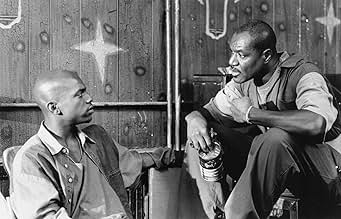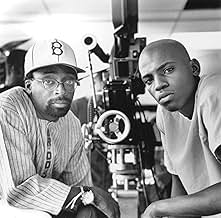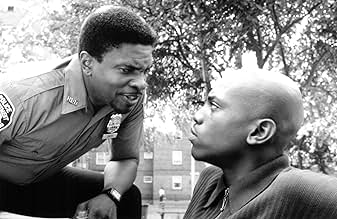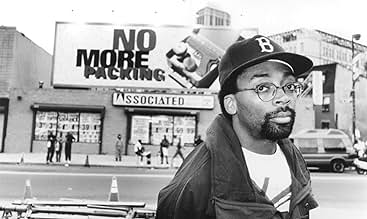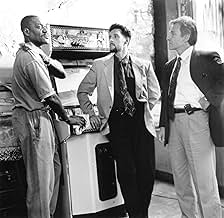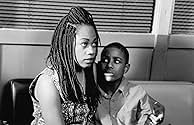उनके ड्रग बॉस और उन्हें पकड़ने निकले जासूसों के बीच फंसे ब्रुकलिन की परियोजनाओं में युवा ड्रग पुशर्स खतरनाक और कठोर जीवन जीते हैं .उनके ड्रग बॉस और उन्हें पकड़ने निकले जासूसों के बीच फंसे ब्रुकलिन की परियोजनाओं में युवा ड्रग पुशर्स खतरनाक और कठोर जीवन जीते हैं .उनके ड्रग बॉस और उन्हें पकड़ने निकले जासूसों के बीच फंसे ब्रुकलिन की परियोजनाओं में युवा ड्रग पुशर्स खतरनाक और कठोर जीवन जीते हैं .
- पुरस्कार
- 6 कुल नामांकन
- Tyrone
- (as Pee Wee Love)
- Errol Barnes
- (as Tom Byrd)
- Go
- (as Fredro)
- Horace
- (as E.O. Nolasco)
- Sharon
- (as Lisa Arrindell Anderson)
फ़ीचर्ड समीक्षाएं
It is not an easy film. It is bleak and at times very off-putting. Actually, if you are a thinking, caring person, this is movie is overall heart-breaking.
But it is brilliant and, for the person who truly tries to understand it, a compelling, insightful look at the problems killing black America today. The only reason for the film's lack of recognition I can imagine is that its subject matter had been examined a number of times before. But the inescapable fact is that this one of the best examinations of the subject matter there has been on screen - on par with "Boyz N The Hood".
And it is FAR from uncreative. In fact, on one level, it is not a "hood" movie, but a whodunit. The mystery aspect of the plot is very interesting. But there are other, more important layers. It is the story of the confusion and crisis of a young man's life. Most importantly, it is a brutal look at drugs, guns, and life in the projects. It is a movie asking why so many young black men are dying in the streets.
The lead character Strike has a stomach problem. It might be an ulcer or something like that. I believe it is a metaphor. Just as heat represented racial tension in Lee's masterpiece "Do The Right Thing", Strike's sickness represents the illnesses plaguing the ghetto: drugs, guns, liquor.
Like DTRT, this film looks at community. The mothers, the cops, the young people, the kids, the men trying to make a living - there is eloquent commentary in "Clockers" on the situations of all. In Spike's movies, paying a little attention is rewarding. A good essay could be written on what I call the Spike Summarization technique. This is when Spike compresses a serious debate or concern in the black community into a few expressive moments of action or dialogue. There are better examples in other movies, but it manifests in "Clockers" a few times. A bunch of kids are sitting in front of Rodney's (Delroy Lindo) shop; one of the kids is rapping while the others pay attention. The two sides to the coin: we feel the artistry and skill of the moment, the continuation of a rich tradition of oral art; we're also struck by the cruelty and coldness in the kid's violent lyrics, and we think about where that comes from.
Stylistically, this movie is a huge success. The cinematography is amazing, and I wonder what must be wrong with my tastes when I'm floored by a film like this and find visually bland a more oft-praised classic. The projects become blinding panoramas, landscapes which add tons of meaning to the poignant ending (I won't reveal it here). The sound is great; many films of this nature use hip hop in the soundtrack to produce certain effects, but "Clockers" does it in a more methodical way which jars some people, but contributes to the film's meaning.
I could say more about the film, but I encourage you to just see it, along with the rest of Spike's oeuvre. He's not a perfect filmmaker, and some of his best films are marred by elements that don't work, but I feel his consistency in terms of delivering brilliance is not below most of the cinema's most celebrated auteurs.
Instead of characters with overt prejudices and plain racial allegiances-characters that are sterile symbols of bigotry rather than credible humans guilty of it-Lee gives us characters of casual racism. Most representative of this is Harvey Keitel's Rocco Klein, a white detective who cannot understand the culture surrounding him, which is a culture of narcotics, violence, and black-on-black crime. On his beat, drugs are less a problem than a lifestyle, murder resolves the tiniest of disagreements, and young mothers valiantly but vainly battle the influence young dealers have on their sons. Klein views the inner-city with contempt, but deep down he knows all the whores and dealers are human beings, too.
Klein is introduced at the scene of a homicide, where the police handle the gruesome death with a clinical sense of detachment, cracking bad jokes and asking the bloodied corpse questions. Is it just a job, or is it racism? For Klein, it's both: he needs the gallows humor to psychologically deal with this culture of depravity. What's fascinating about CLOCKERS is Lee's willingness-and guts-to present Klein, despite his prejudice, as the film's hero. Lee understands that casual racism is simply endemic and inescapable in American culture. What he appreciates is Klein's ability to transcend his own prejudice and finally do the right thing.
Clockers has a main plot that pushes along, as the murder by multiple gun-shots of a Darryl, black fast-food worker, who was also apart of the crew of Rodney (Delroy Lindo), call into question who might have done it. At first, it seems pretty open and shut, as Victor (Isaiah Washington) comes forth and admits he did it in self-defense. Rocco Klein (Harvey Keitel) doesn't buy it, seems too easy, so he asks around, digs deeper, and sees that his brother, Strike (Mekhi Pfeifer) seems to be much more of the guilty party, by way of how he handles himself in the streets, his repore with Rodney, and as having more motive to kill Darryl. It's through this that Lee then branches it out to make it as much as character as about plot, where the ties between certain characters, like Strike and Tyrone, a pre-teen who looks up to Strike like a surrogate father, are mostly defined by how the neighborhood works out in the open. The clockers are bunch of would-be gang-bangers who talk a lot of talk, but haven't walked nearly as much as Earle, best friend of Rodney's and psychopathic murder, or Rodney himself, who has that veneer of being like the one you can trust the most- half surrogate father as well and half good cop/bad cop boss- until he gets crossed.
Although Price's material, which comes through with the energy and occasional wit, is noticeable throughout, it's really Spike Lee as director and many of the actors who make this a consistently watchable movie. Lee is never one to be too subtle with the camera, and he has variations with how he deals with the material to make it very observant but also subjective. Early on, for example, we see the clockers making their deals in the park in long-shot, shaky, as if Lee's filming it far away for a reality TV show. But then we also see the 360 degree camera moves as Klein questions Strike. There's many camera moves that are practically trademark Lee shots, especially with the lighting, as Klein questions Tyrone, or when we see a flashback to Victor having to deal with some clockers. It's all very flamboyant and meant to call attention to the material, and aside from a few unneeded music choices (it's the only time you'll hear Seal in a drug dealer crime movie), he's on top of things. Meanwhile, the performances are all top-notch, usually, as Keitel and particularly Lindo play their characters so well by pretty much being how we think the actors 'really' are, even though they're not. Pfeifer has a little trickier a time with his performance, because he usually is on a very similar note: I didn't do nothing, is his usual beat. His character also has the intriguing qualities that mark him as something of an outsider however in he might be: his stomach virus, which is never resolved but always looming over him, and his love of electric train-sets.
And all the while, Clockers succeeds in presenting a time and place where there should be little to no hope, and it makes the cops and criminals both pretty well-rounded when compared to other genre films. The cops are meant to be the good guys, but there's also a steady conflict between Klein and his partner: why should Klein care so much as to who did it or why (Strike also asks this question towards the end, in one of the best scenes in the film)? And Strike and Rodney are not cut-outs from black exploitation flicks, but with more of a push and pull tie that is always a threat, never a comfort. There are little details that help make Lee's film interesting when it veers into being like a television serial; the white yuppies who get entangled in the case; the over-protective but very smart cop (Keith David, always a pro) who also tries to play surrogate father to Tyrone, albeit without the same care, however negative, as Strike has; the brief shots of the drug addicts with their habits on display, as we only need to see it for less than a minute to get the nature of the bottom of the food chain, which is total despair. Lee's film, however, isn't really disparaging as it has moments of hope, yet a hope meant to be in understanding that there's no easy way out of all of this.
क्या आपको पता है
- ट्रिवियाWas originally supposed to be directed by Martin Scorsese. Rocco Klein would have been the main character, played by Robert De Niro. Scorsese changed his mind, opting instead to direct Casino (1995), and De Niro went with him. Scorsese then asked Spike Lee if he wanted to direct. Lee accepted (and decided that Strike, not Rocco, would be the primary character), and Scorsese was given an "Executive Producer" credit.
- गूफ़When Detective Mazilli is walking up to the back of the Mercedes Benz to talk to the kids inside his badge/shield is that of an NYPD Detective. However when he shows it to the driver of the car it is the shield of a NYPD Sergeant.
- भाव
Rodney: If God created anything better than crack cocaine, he kept that shit for hisself. I mean, that shit is like truth serum. It will truly expose who you are. I mean, you happen to be a low-life rat bastard motherfucker, who will sell off his newborn for a suck off that glass dick, crack will bring it right on in the light. Now, I don't care you black, white, Chinese, rich, poor. You take that first hit, you on a mission. And that mission will never end. Even when the house, the money, loved ones are gone, they send you to the joint, you still gonna try to cop.
Ronald 'Strike' Dunham: No doubt.
Rodney: Only time it ends, Strike, that mission, when you six feet under.
- कनेक्शनFeatured in Crooklyn Dodgers: Return of the Crooklyn Dodgers (1995)
टॉप पसंद
- How long is Clockers?Alexa द्वारा संचालित
विवरण
- रिलीज़ की तारीख़
- कंट्री ऑफ़ ओरिजिन
- भाषा
- इस रूप में भी जाना जाता है
- Clockers: Hermanos de sangre
- फ़िल्माने की जगहें
- उत्पादन कंपनियां
- IMDbPro पर और कंपनी क्रेडिट देखें
बॉक्स ऑफ़िस
- बजट
- $2,50,00,000(अनुमानित)
- US और कनाडा में सकल
- $1,30,71,518
- US और कनाडा में पहले सप्ताह में कुल कमाई
- $44,63,560
- 17 सित॰ 1995
- दुनिया भर में सकल
- $1,30,71,518
- चलने की अवधि2 घंटे 8 मिनट
- रंग
- ध्वनि मिश्रण
- पक्ष अनुपात
- 1.85 : 1
इस पेज में योगदान दें



